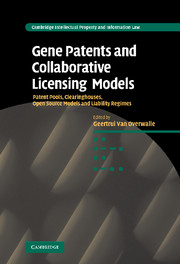 Gene Patents and Collaborative Licensing Models
Gene Patents and Collaborative Licensing Models Book contents
- Frontmatter
- Contents
- List of contributors
- Preface
- Foreword: Jean-Jacques Cassiman
- List of abbreviations
- Part I Patent pools
- Part II Clearinghouses
- Part III Open source models
- 12 Open source genetics. Conceptual framework
- 13 Case 8. CAMBIA's Biological Open Source Initiative (BiOS)
- 14 Case 9. Diversity Arrays Technology Pty Ltd. (DArT) Applying the open source philosophy in agriculture
- 15 Critical commentary on ‘open source’ in the life sciences
- 16 Several kinds of ‘should’. The ethics of open source in life sciences innovation
- Part IV Liability regimes
- Part V Different perspectives
- Part VI Summary and concluding analysis
- Index
- Titles in the series
16 - Several kinds of ‘should’. The ethics of open source in life sciences innovation
from Part III - Open source models
Published online by Cambridge University Press: 14 January 2010
- Frontmatter
- Contents
- List of contributors
- Preface
- Foreword: Jean-Jacques Cassiman
- List of abbreviations
- Part I Patent pools
- Part II Clearinghouses
- Part III Open source models
- 12 Open source genetics. Conceptual framework
- 13 Case 8. CAMBIA's Biological Open Source Initiative (BiOS)
- 14 Case 9. Diversity Arrays Technology Pty Ltd. (DArT) Applying the open source philosophy in agriculture
- 15 Critical commentary on ‘open source’ in the life sciences
- 16 Several kinds of ‘should’. The ethics of open source in life sciences innovation
- Part IV Liability regimes
- Part V Different perspectives
- Part VI Summary and concluding analysis
- Index
- Titles in the series
Summary
What is the matter? Has Protagoras robbed you of anything? Yes, indeed he has, Socrates, of the wisdom which he keeps from me. But, surely … if you give him money, and make friends with him, he will make you as wise as he is himself.
A sui generis ethical space for life sciences innovation?
Life science innovators work in an ethical space that is distinct from the general run of technology, whether or not they would choose this status. We expect life science innovation to serve such fundamental human needs as health, nutrition and environmental protection, and to deliver its fruits in the forms of proven and effective technologies as widely and equitably as possible. The call for access to the fruits of this innovation is more insistent than for any other technology, because essential human wellbeing – even life itself – is at stake; because a good proportion of the upstream inputs to applied life sciences research are derived from the public sector or from research funded by public or philanthropic sources; and because genetic inputs to research – biodiversity, human tissue, seeds – pose sui generis ethical and legal questions. Society's scrutiny over life sciences innovation is therefore more stringent and vigorously debated than the regular run of technology, a scrutiny expressed at the ethical, political and formal regulatory levels.
- Type
- Chapter
- Information
- Gene Patents and Collaborative Licensing ModelsPatent Pools, Clearinghouses, Open Source Models and Liability Regimes, pp. 219 - 244Publisher: Cambridge University PressPrint publication year: 2009
- 2
- Cited by


